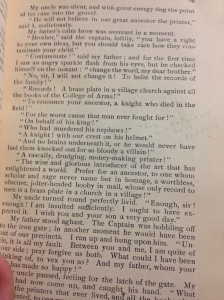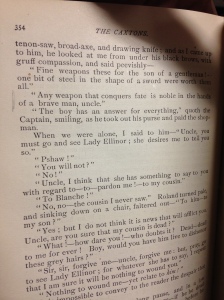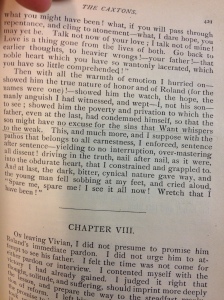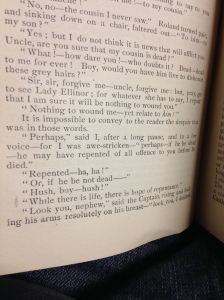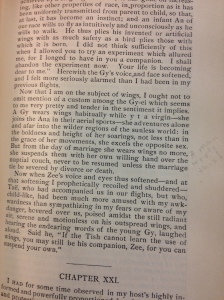When exploring Edward Bulwer Lytton’s novel The Caxtons, I found plenty of marginalia of multiple kinds spanned throughout its pages. The novel focuses on the struggle of the Caxton family to keep their prestigious ancestry and tradition alive. Some of the marginalia I have chosen relates to this, while other instances were annotations denoting influential quotes or comments on Lytton’s writing.
This excerpt from the text shows a comment on a group of dialogue that reads “This calumny will go on forever!”. For those unfamiliar with the term, a calumny is defined as a false or malicious statement designed to injure the reputation of someone or something. In this scene, we see one character attacking one of the Caxtons about the honor of their ancestor. It is clear that the calumny the reader who wrote this is referring to is the attacking of the Caxton ancestor.
This excerpt of the text is most likely marked up due to the novel’s theme of the rejection of fate and destiny. “Any weapon that conquers fate is noble in the hands of a brave man, uncle”. The fate which needs conquering would be the conformity to social norms based on one’s ancestry, such as Pisistratus Caxton must face in this novel. Eventually fate is conquered when the great Caxton name is plagued with financial instability, preventing him from becoming the scholar that his father and ancestors were. Multiple Caxtons move to Australia at the end of the novel which symbolizes redemption and the freedom from that useless fate which consumed their name for so long.
These marginalia don’t necessarily involve the plot of the novel, but they do offer insightful quotes about life and human nature.
“so that the son might have no excuse for the sins that Want whispers to the weak.”
“While there is life, there is hope of repentance”
The final piece of marginalia that I wish to discuss regards gender roles in the Victorian era. the passage in the image describes a woman who does not follow the social norms of the era but is not frowned upon either. Instead the author surprisingly puts her equal if not above any man. This passage surprised me, and surprised the other reader as well leading him to write “A man wrote this!” in the right hand margin.
